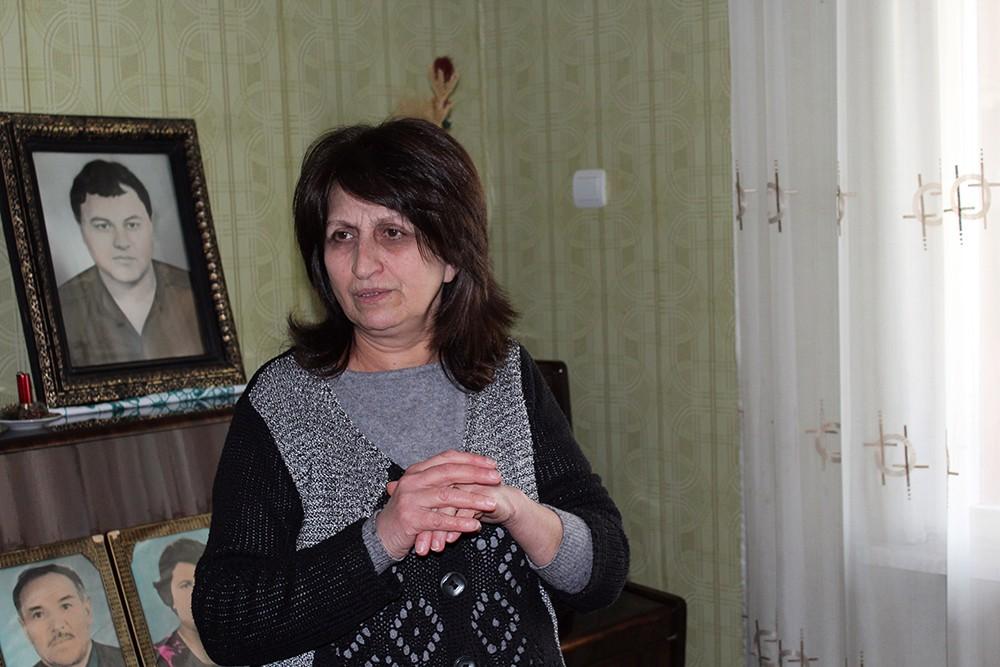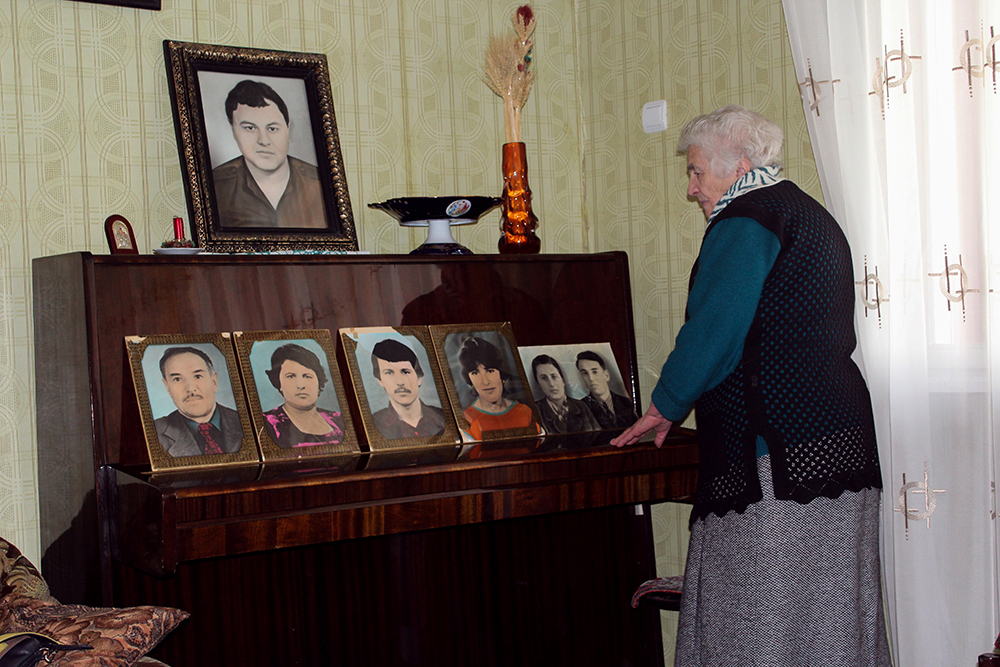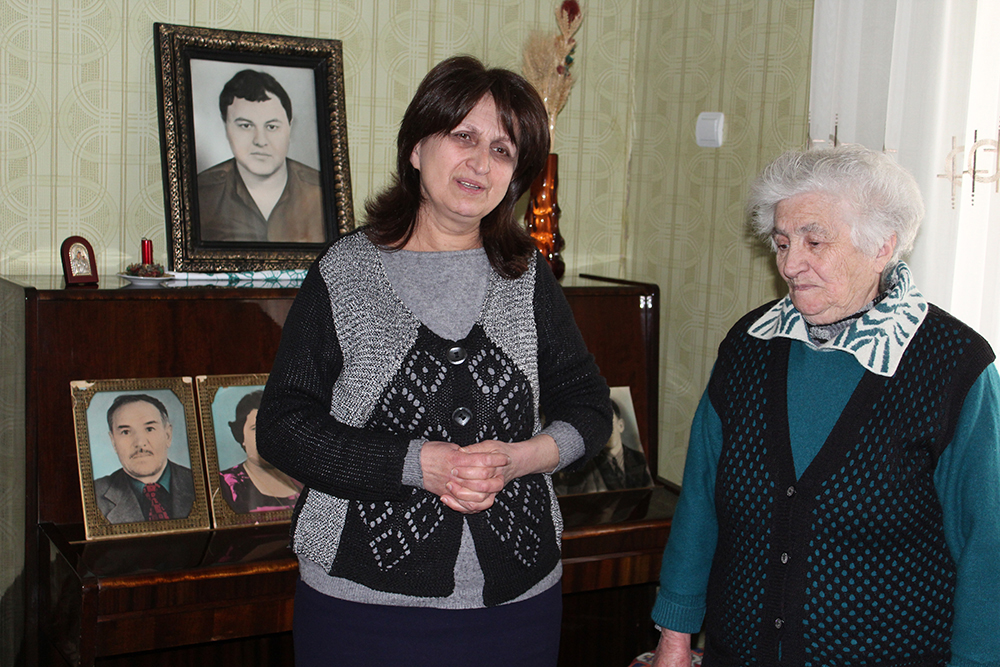
30 Years After Sumgait Pogroms: Karineh Melkumyan Recalls the Slaughter of Her Family Members
One of the Soviet military units was located in Nasosnoye, the western part of Sumgait. When the pogrom was over, the Soviet army escorted the surviving Armenians there.
Karineh Melkumyan is one of those survivors. She recalls the afterwards visit of her former colleagues from the school. "They even came to sympathize with me, bringing my salary. I could not make myself look at their faces, I could not take the money, though I was without a penny and clothes. I had two children, and I was six months pregnant with the third one. My husband was killed and I did not know what to do next. They had heard that my husband was brutally murdered and came to offer condolences. I could not accept their condolences, although it was probably not their fault," says Karineh.
The official number of victims of Sumgait pogroms was thirty. Out of thirty, five were from Melkumyans family - Karineh's husband, brother-in-law, sister-in-law, and parents-in-law.

I got acquainted with Karineh in the early nineties. When we first met in their apartment in Byureghavan, she could speak of nothing else but the events of February 1988, in detail, over and over again, like it had happened several hours, not several years ago. While telling, her whole face grimaced, and she trembled. I didn’t risk to interrupt, though, thinking that she needed to tell the story.
We met again a couple of years later, and Karineh was telling the same story, with the same tension. I tried to persuade to take away the portraits of the murdered relatives hanging on the wall of her apartment, and not to tell the story in the presence of the children, but Karineh never seemed to listen to my advice.
Every time I saw Karineh, I heard her terrible story. Despite the horror she’d gone through and kept on telling about, Karineh was always kind, always gentle and caring.
A few months ago, Karineh called me and said that she had taken the portraits away. We met in a cafe, had tea, talked about life and difficulties. Karineh did not mention Sumgait.
During these thirty years, she has managed to raise her three children. When I used to visit them in Byureghavan, where Sumgait survivors were housed in apartments in some multi-apartment buildings, I saw their hardships, but she never complained of cold or having little money.
Once in 1995, the winter was very cold, while their apartments were not heated. When I inquired the refugee department about the firewood, the head of the department, Vladimir Movsisyan, got amazed and angry, saying, "What are you saying, how could I steal the firewood, when it’s me who has housed them?" It was indeed so, Movsisyan had done a lot, but the firewood did not reach Byureghavan. Movsisyan promised to solve the problem within three days, but he asked me to check it out. When I went back to Byureghavan, the firewood had already reached them.
A few days ago, we went to Byureghavan again. Karineh had removed the portraits of her relatives from the wall and hung a painting with spring flowers instead. On the occasion of our visit, she took out the portraits and imagined what a great family they could be now. The apartment was so clean and tidy that it seemed like no one lived there. Her two daughters have got married, and it’s now Karineh, her mother and her son living in the apartment. When Karineh started recalling the pogrom events again, her son silently went out. Karineh said he couldn’t bear to hear her stories.
Every time I hear Karineh’s story, someone becomes the protagonist for me. This time, it was her sister-in-law, Irina, who was only twenty years old in 1988. When the crowd approached the building, Irina got to the balcony, grabbed a pole for grapes with her leg and moved her nephew and nieces to one of their Azerbaijani neighbors’ balcony, without asking permission. Then she helped her sisters-in-law. When Irina went back to their apartment, where her father, mother, brothers were still in, the crowd was already inside the building. They ran to an Azerbaijani apartment on the last floor. Karineh, her children, Karineh's sister-in-law and her little daughter, being repelled by their neighbour, reached the last floor, too, after having knocked all the doors, begging for help. The neighbor who finally opened the door to them was a Lezgin. He was frightened, but he let them in and hid them in the bathroom. Shortly after, the savages began to beat the door. The Lezgin neighbor opened the door, but right at that moment they found Melkumyan brothers and sister in the opposite apartment, shouting "Ok, those are here." Thus, half of the family stayed alive due to the other half being uncovered.
At four in the morning, when they went out of the building to escape, one could see only contours in the dark city. Karineh recalls, "I possibly walked over my husband's and his brother's blood, but at that moment I did not realize anything. When we reached the yard, I noticed someone leaning to the telegraph pole. I was frightened, but I got closer. It was our Irina - tied, dead, and burnt. Irina saved my children, they wouldn’t be alive if not for her. "
Karineh told us the whole story again, from beginning to end.
She says the Lezgin neighbor was a witness at the trial in Moscow. The Armenians hugged and saluted him.

Karineh Melkumyan and her mother, Elena Arushanyan
We know the word "survivor" and use it with reverence. However, out of fifteen families housed in Byureghavan, only six remain there now. They did not get any status: they weren’t recognized as survivors. Somehow, the titanic effort they put into getting back to ordinary life went unnoticed. These are people who saw their family members being tortured. These are women and children who managed to run away from the crowd with axes. This fact cannot be forgotten or healed. These memories can only get milder in case of leading a very good life. But leading a very good life is too impossible for them.
These people are only happier when their burden gets a little lighter, thanks to any help. They have no other joy. They have somehow raised their children, who are now thirty or older.
It has been thirty years since February 1988.
First photo: Karineh Melkumyan
 Videos
Videos Photos
Photos




Write a comment